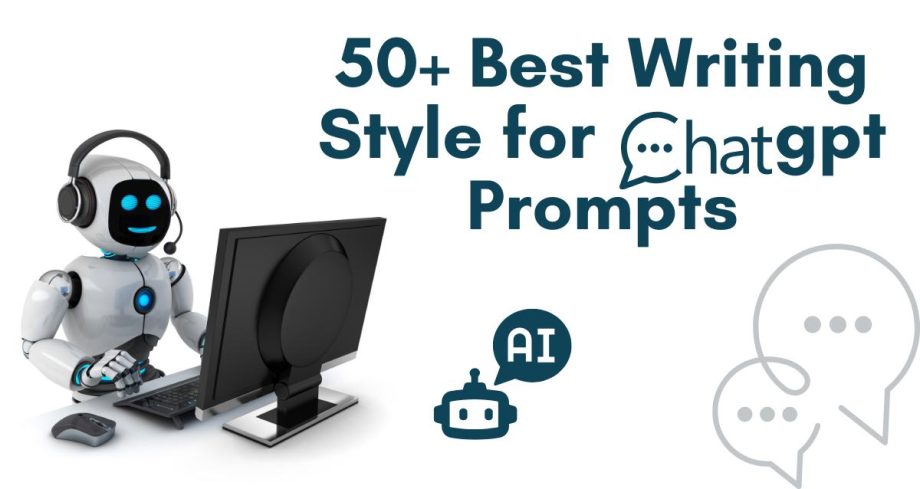In the digital age, where content is king, the ability to craft compelling narratives is more important than ever. Whether you’re a seasoned writer or just starting, understanding different writing styles can elevate your work and engage your audience more effectively. This article presents over 50+ best writing style for chatgpt prompts, empowering you to create diverse and captivating content.
Table of Contents
Lets talk 50+ best writing style for chatgpt prompts
1. Descriptive
- Capture the reader’s imagination with vivid imagery. Create a mental picture using sensory details.
- Prompt: “Describe a peaceful lakeside at sunset, describing the colours, sounds, and smells.”
2. Narrative
- Write a story with a clear structure—beginning, middle, and end—and engage readers with characters and a plot.
- Prompt: “Describe how a lost dog finds its way home.”
3. Persuasive
- Encourage your audience to adopt a particular viewpoint or take action. Use strong arguments and emotional appeals.
- Prompt: “Explain why readers should adopt pets from shelters.”
4. Expository
- Provide clear explanations or information about a topic. Provide readers with facts and examples that will help them to understand.
- Prompt: “Explain the process of photosynthesis in simple terms.”
5. Technical
- Straightforwardly deliver complex information. Use precise language for specialised fields.
- Prompt: “Construct a technical guide for setting up a home network.”
6. Poetic
- Utilise rhythm, metaphor, and symbolism to evoke emotions. Play with language to create lyrical beauty.
- Prompt: “Compose a poem about the changing seasons.”
7. Humorous
- Make your audience laugh with wit and comedic elements. Timing and relatability are key.
- Prompt: “Describe how a cat believes that it is a dog.”
8. Reflective
- Share personal thoughts and insights on a topic. Encourage introspection and connection with readers.
- Prompt: “Explain what you learned from a childhood experience.”

9. Journalistic
- Report facts and news in an unbiased manner. Stick to the “who, what, where, when, why” format.
- Prompt: “Write a news article about a local event that brought the community.”
10. Argumentative
- Take a stance on a controversial issue. Provide proof and rebuttals to back up your claims.
- Prompt: “Argue for or against the use of social media in education.”
11. Fantasy
- Create an imaginative world with magical elements. Develop rich lore and compelling characters.
- Prompt: “Describe a world in which people and dragons live side by side.”
12. Historical
- Dive into a specific period or event, incorporating accurate details and context.
- Prompt: “Write a letter from a soldier during World War II.”
13. Science Fiction
- Explore futuristic concepts and technology. Challenge the boundaries of reality.
- Prompt: “Imagine a day in the life of a human living on Mars.”
14. Romantic
- Focus on love and relationships, exploring emotions and connections between characters.
- Prompt: “Write a love letter between two star-crossed lovers.”
15. Adventure
- Craft a thrilling narrative filled with action and exploration. Engage readers with suspense and excitement.
- Prompt: “Tell the tale of a treasure hunt in a lost jungle city.”
16. Satirical
- Use humour, irony, or exaggeration to critique society or human behaviour.
- Prompt: “Create a satirical article about modern dating apps.”
17. Autobiographical
- Candidly share personal stories or experiences. Foster connection through honesty.
- Prompt: “Write a chapter about your first experience travelling abroad.”
18. Stream of Consciousness
- Capture thoughts as they flow, creating a raw and authentic narrative.
- Prompt: “Write a stream-of-consciousness piece about waking up in the morning.”
19. Dialogue-Driven
- Focus on conversations between characters to advance the plot and develop personalities.
- Prompt: “Write a conversation between a mentor and mentee discussing career choices.”
20. Memoir
- Reflect on specific moments or themes in your life, blending storytelling with deeper insights.
- Prompt: “Tell the story of a summer that changes your perspective on life.”
21. Character Study
- Delve deep into a character’s psyche, exploring their motivations and fears.
- Prompt: “Analyze the character of a villain in a popular movie, discussing their backstory.”
22. Travelogue
- Document your travels with personal anecdotes, cultural observations, and insights.
- Prompt: “Write a travelogue about your experiences in a bustling city.”
23. Critical Review
- Evaluate a book, movie, or artwork, discussing strengths, weaknesses, and personal impressions.
- Prompt: “Critique on a recent blockbuster movie and its cultural impact.”
24. Fable
- Create a moral story featuring animals or inanimate objects that teach a lesson.
- Prompt: “Write a fable about a fox and a crow that teaches the value of honesty.”
25. Chronicle
- Document events in chronological order, providing a comprehensive overview of a topic or story.
- Prompt: “Chronicle the major events of a historical figure’s life.”
26. Social Commentary
- Discuss societal issues and offer opinions, encouraging readers to reflect on their beliefs.
- Prompt: “Write a piece on the impact of climate change on urban living.”
27. Experimental
- Break conventional writing rules to create a unique style or form.
- Prompt: “Experiment with a poem that incorporates visual elements.”
28. Parody
- Mimic is a style or genre humorously to make a point or entertain.
- Prompt: “Write a parody of a popular fairy tale.”
29. Advice Column
- Provide guidance or opinions on personal dilemmas or societal issues.
- Prompt: “Write an advice column for someone struggling with work-life balance.”
30. Flash Fiction
- Craft a very short story, focusing on a moment or a twist that evokes strong emotions.
- Prompt: “Write a flash fiction piece about an unexpected reunion.”
31. Allegory
- Use symbolic figures and actions to convey deeper meanings or moral lessons.
- Prompt: “Create a story about the struggle between contentment and ambition.”
32. Mythological
- Draw inspiration from ancient myths to create new tales with universal themes.
- Prompt: “Describe a modern myth about a digital-age hero .”
33. Guided Meditation
- Create a calming narrative to guide readers through a meditation process.
- Prompt: “Create a script for a guided meditation to help you de-stress and unwind. “
34. Case Study
- Examine a particular subject in detail to draw conclusions or insights.
- Prompt: “Examine a case study of an effective advertising effort .”
35. Instructional
- Provide step-by-step guidance on completing a task or project.
- Prompt: “Write an instructional guide on how to start a podcast.”
36. Eclectic
- Blend various styles and genres to create a unique voice.
- Prompt: “Write a work that blends realistic and fantastical themes .”
37. Public Speaking
- Craft a speech aimed at inspiring or informing an audience.
- Prompt: “Write a motivational speech for high school graduates.”
38. Blog Post
- Write an informal, conversational piece for an online audience.
- Prompt: “Create a blog post about the benefits of daily journaling.”
39. Columnist
- Share personal opinions and insights regularly on a specific topic.
- Prompt: “Write a columnist piece on the importance of mental health awareness.”
40. Speculative Fiction
- Explore “what if” scenarios, imagining alternative realities or futures.
- Prompt: “Imagine a world where humans can communicate with animals.”
41. Informal/Conversational
- Adopt a casual tone to create relatability and ease for the reader.
- Prompt: “Write a casual letter to a friend about your recent adventures.”
42. Editorial
- Express opinions on current events or societal issues in a journalistic style.
- Prompt: “Write an editorial about the importance of voting in elections.”
43. Anthology
- Curate various pieces on a theme, showcasing diverse voices or perspectives.
- Prompt: “Collect several pieces of poetry on love from many cultures.”
44. Dialogue with Self
- Create an internal dialogue exploring personal conflicts or decisions.
- Prompt: “Write a conversation between your past self and your future self.”

More read:
- VandyWorks: Supporting Work-Life Balance at VUMC
- LinkedIn Data Scraping: What You Need to Know in 2024
- Oprekladač: Language Translation for the Digital Age
- LinkedIn Job Scraper: What You Need to Know in 2024
45. Quirky
- Use an unconventional style filled with unusual characters or situations.
- Prompt: “Explain the typical day in the life of a detective who cracks food-related riddles .”
46. Inspirational
- Write motivational pieces aimed at encouraging readers to take action or embrace positivity.
- Prompt: “Create an inspirational piece about overcoming adversity.”
47. Listicle
- Present information in a list format for easy consumption.
- Prompt.”List ten strategies to improve your creativity.”
48. Tech Review
- Provide insights and evaluations on the latest gadgets or software.
- Prompt: “Write a review of a new smartphone and its standout features.”
49. Cultural Commentary
- Discuss cultural trends or phenomena, analyzing their significance.
- Prompt: “Write a piece on the evolution of fashion trends over the decades.”
50. Personal Essay
- Share personal experiences that resonate with broader themes.
- Prompt: “Write a personal essay about the impact of a significant mentor in your life.”
51. Microfiction
- Tell a complete story in a very limited word count, often under 100 words.
- Prompt: “Write a piece of microfiction about a lost key.”

Conclusion
Each writing style serves a different purpose and can help you express your ideas in unique ways. Experimenting with these prompts can not only enhance your writing skills but also broaden your creative horizons. The versatility of writing styles ensures that there’s always a new approach to explore, making the journey of writing both exciting and rewarding. So grab your pen (or keyboard) and start crafting—your next masterpiece awaits!
FAQs of Best Writing Style For Chatgpt Prompts
Q. What is the best writing style for ChatGPT prompts?
A: There isn’t one best writing style for ChatGPT prompts; it depends on your goal. For creative storytelling, narrative and descriptive prompts work well. For technical help, use an expository or technical writing style.
Q. How can I tailor prompts to get better responses from ChatGPT?
A: Be specific and clear in your prompts. Define the tone, style, or outcome you want, such as asking for a “descriptive paragraph” or “a persuasive argument” to get more focused results.
Q. What writing style works best for storytelling prompts?
A: For storytelling, narrative, fantasy, or adventure writing styles are ideal, as they allow ChatGPT to create structured plots with engaging characters and events.
Q. Can I use multiple writing styles in a single prompt?
A: Yes, you can blend styles to create a more complex response. For example, you might combine a humorous and satirical style to critique a topic in a fun, engaging way.
Q. What style should I use for informative content?
A: Expository or technical writing styles are best for informative prompts, as they focus on clear, concise explanations, facts, and step-by-step instructions.
Q. How do I get ChatGPT to write emotional or introspective content?
A: Use reflective or poetic writing styles in your prompts to guide ChatGPT towards producing emotional, introspective, or lyrical content.
Q. Can ChatGPT handle creative writing styles like fantasy or science fiction?
A: Yes, ChatGPT is well-suited to handle creative styles such as fantasy, science fiction, or mythological prompts. It can develop imaginative worlds, characters, and futuristic scenarios.
Q. What is the best style for engaging readers in persuasive content?
A: For persuasive content, use the persuasive writing style, focusing on strong arguments, emotional appeal, and logical reasoning to convince the audience.
Q. How should I structure a prompt for technical content?
A: For technical content, clearly define the task or topic. Use a technical writing style that asks ChatGPT to explain complex information in a straightforward, step-by-step manner.
Q. Can I use humour or satire in prompts with ChatGPT?
A: Yes, humorous and satirical writing styles work well in ChatGPT prompts. You can ask it to write funny stories, parodies, or satirical articles to create entertaining content.
